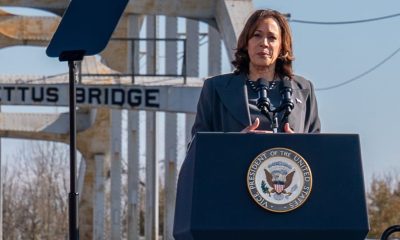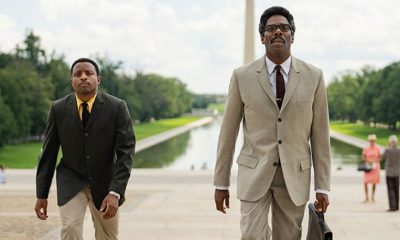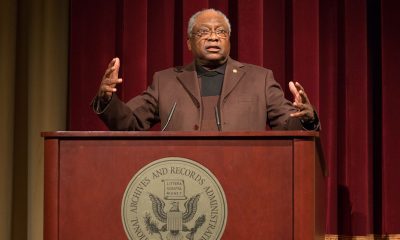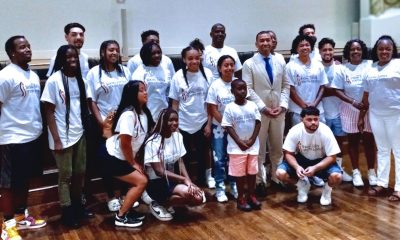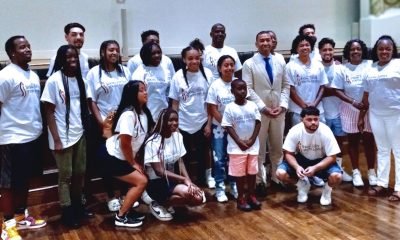National
5 Things About the 50th Anniversary of the Selma Marches

In this March 1965 file photo, Martin Luther King, center, leads a march from Selma to Montgomery, Ala. In early 1965, King’s Southern Christian Leadership Conference began a series of marches as part of a push for black voting rights. (AP Photo/File)
JESSE J. HOLLAND, Associated Press
WASHINGTON (AP) — This weekend marks the 50th anniversary of “Bloody Sunday,” a civil rights march in which protesters were beaten, trampled and tear-gassed by police at the Edmund Pettus Bridge in Selma, Alabama. On March 7, 1965, marchers were walking from Selma to the state capital, Montgomery, to demand an end to discriminatory practices that robbed blacks of their right to vote. It took two more attempts for marchers to successfully complete their journey. Images of the violence during the first march shocked the nation and turned up the pressure to pass the Voting Rights Act of 1965, which helped open voter rolls to millions of Southern blacks.
Five things to know about Bloody Sunday:
___
SELMA TO MONTGOMERY
The march was conceived by James Bevel, one of Martin Luther King Jr.’s aides. After a 26-year-old black church deacon, Jimmie Lee Jackson, was fatally shot by a state trooper during an earlier march in Marion, Alabama, Bevel suggested that protesters carry Jackson’s casket from Marion to the steps of the state capitol. A protest march was planned instead, and the starting point changed to Selma. That march ended in the Bloody Sunday beatings.
Afterward, King issued a call for volunteers and ministers to come to Selma for a second march. However, federal judge Frank M. Johnson had forbidden marches pending his ruling on a petition to shield marchers from police interference. To heed the judge’s order, King led protesters two days later, on Tuesday, March 9, 1965, to the Pettus bridge, where they kneeled, prayed, sang and left. King’s refusal to take the march across the bridge, where Alabama lawmen were waiting, led critics to call the second march “Turnaround Tuesday.”
Johnson ordered federal protection for the marchers, and on March 21, 1965, thousands of marchers made the 50-mile journey to Montgomery. Two other people were also killed during these protests: James Reeb, a white Unitarian minister who was beaten to death by local whites on March 11 and Viola Liuzzo, a white Michigan woman who was fatally shot by the Ku Klux Klan on March 25.
___
WHERE WAS KING?
Martin Luther King Jr. was not in Selma for the Bloody Sunday march, although he had been there before working on voting rights issues, even doing a stint in jail there. King was obliged to preach at his church in Atlanta on the day people showed up to march to Montgomery, since it was their “Men’s Day” program, former King aide Andrew Young said. Young said they heard that people were showing up to march and so he immediately headed to Selma.
He and other King aides then telephoned Atlanta to convince King not to call it off.
“We persuaded him that since there were about three hundred people there, maybe they could go ahead and march, that they weren’t going to get far, anyway,” Young said in interviews for the documentary “Eyes on the Prize: America’s Civil Rights Years (1954-1965).” ”That we had seen the state troopers and they were going to probably stop them and turn them around, or maybe they would, people would get arrested.
“So he said, ‘Well, OK, go ahead and march,’ he said, ‘but don’t you all go to jail,'” Young said.
___
SHERIFF WITH NO REGRETS
One of the most polarizing figures of the Selma movement was Dallas County Sheriff Jim Clark, who’d already had several confrontations with protesters before the Bloody Sunday beatings. In fact, Clark insisted that the protesters who knelt down to pray before the state troopers attacked had actually provoked the police first. “The marchers fell to the ground and as the troopers moved on to them, that was when they attacked the troopers with ice picks, and straight razors, and knives, and even broken glass,” Clark told interviewers for the same “Eyes on the Prize” documentary. “And that was when they used tear gas on them and they started retreating across the bridge at that time.”
Clark lost his next election in 1966. He ended up selling mobile homes and once was sentenced to prison for conspiring to smuggle marijuana. He died in 2007.
In a 2006 interview, Clark told the Montgomery Advertiser that he did not regret his actions in Selma. “Basically, I’d do the same thing today if I had to do it all over again,” Clark said. “I did what I thought was right to uphold the law.”
___
MALCOLM X
Malcolm X had visited Selma in the weeks leading up to Bloody Sunday to support the voting rights movement there. By the time he arrived, King was in a Selma jail for protesting voting discrimination in the South. The two had first met the year before on Capitol Hill during Senate debate of the Civil Rights Act of 1964.
Malcolm X shared the podium with King’s wife, Coretta Scott King, at Brown Chapel African Methodist Episcopal Church, and Mrs. King told “Eyes on the Prize” interviewers that Malcolm X said he had changed his mind about visiting King in jail, and asked her to pass along a message.
“I didn’t come to Selma to make his job more difficult, but I thought that if the white people understood what the alternative was that they would be more inclined to listen to your husband,” she said he told her.
Malcolm X was assassinated on February 21, 1965, in New York City, roughly two weeks before Bloody Sunday.
___
CONGRESSIONAL GOLD MEDAL
Congress on Tuesday authorized the awarding of the Congressional Gold Medal to the marchers who participated in all three Selma-to-Montgomery marches. “This nation should never forget the sacrifices those who refused to accept second-class citizenship and demanded that our nation live up to the very ideals on which it was founded.” said Rep. Terri Sewell, D-Ala.
The Congressional Gold Medal is Congress’s highest honor.
Copyright 2015 The Associated Press. All rights reserved. This material may not be published, broadcast, rewritten or redistributed.
Activism
Oakland Post: Week of April 17 – 23, 2024
The printed Weekly Edition of the Oakland Post: Week of April 17 – 23, 2024

To enlarge your view of this issue, use the slider, magnifying glass icon or full page icon in the lower right corner of the browser window. ![]()
Barbara Lee
Congresswoman Barbara Lee Issues Statement on Deaths of Humanitarian Aid Volunteers in Gaza
On April 2, a day after an Israeli airstrike erroneously killed seven employees of World Central Kitchen (WCK), a humanitarian organization delivering aid in the Gaza Strip, a statement was release by Rep. Barbara Lee (D-CA-12). “This is a devastating and avoidable tragedy. My prayers go to the families and loved ones of the selfless members of the World Central Kitchen team whose lives were lost,” said Lee.

By California Black Media
On April 2, a day after an Israeli airstrike erroneously killed seven employees of World Central Kitchen (WCK), a humanitarian organization delivering aid in the Gaza Strip, a statement was release by Rep. Barbara Lee (D-CA-12).
“This is a devastating and avoidable tragedy. My prayers go to the families and loved ones of the selfless members of the World Central Kitchen team whose lives were lost,” said Lee.
The same day, it was confirmed by the organization that the humanitarian aid volunteers were killed in a strike carried out by Israel Defense Forces (IDF). Prior to the incident, members of the team had been travelling in two armored vehicles marked with the WCF logo and they had been coordinating their movements with the IDF. The group had successfully delivered 10 tons of humanitarian food in a deconflicted zone when its convoy was struck.
“This is not only an attack against WCK. This is an attack on humanitarian organizations showing up in the direst situations where food is being used as a weapon of war. This is unforgivable,” said Erin Gore, chief executive officer of World Central Kitchen.
The seven victims included a U.S. citizen as well as others from Australia, Poland, the United Kingdom, Canada, and Palestine.
Lee has been a vocal advocate for a ceasefire in Gaza and has supported actions by President Joe Biden to airdrop humanitarian aid in the area.
“Far too many civilians have lost their lives as a result of Benjamin Netanyahu’s reprehensible military offensive. The U.S. must join with our allies and demand an immediate, permanent ceasefire – it’s long overdue,” Lee said.
Commentary
Commentary: Republican Votes Are Threatening American Democracy
In many ways, it was great that the Iowa Caucuses were on the same day as Martin Luther King Jr. Day. We needed to know the blunt truth. The takeaway message after the Iowa Caucuses where Donald Trump finished more than 30 points in front of Florida Gov. De Santis and former South Carolina Governor Nikki Haley boils down to this: Our democracy is threatened, for real.

By Emil Guillermo
In many ways, it was great that the Iowa Caucuses were on the same day as Martin Luther King Jr. Day.
We needed to know the blunt truth.
The takeaway message after the Iowa Caucuses where Donald Trump finished more than 30 points in front of Florida Gov. De Santis and former South Carolina Governor Nikki Haley boils down to this: Our democracy is threatened, for real.
And to save it will require all hands on deck.
It was strange for Iowans to caucus on MLK day. It had a self-cancelling effect. The day that honored America’s civil rights and anti-discrimination hero was negated by evening.
That’s when one of the least diverse states in the nation let the world know that white Americans absolutely love Donald Trump. No ifs, ands or buts.
No man is above the law? To the majority of his supporters, it seems Trump is.
It’s an anti-democracy loyalty that has spread like a political virus.
No matter what he does, Trump’s their guy. Trump received 51% of caucus-goers votes to beat Florida Gov. Ron DeSantis, who garnered 21.2%, and former South Carolina Gov. Nikki Haley, who got 19.1%.
The Asian flash in the pan Vivek Ramaswamy finished way behind and dropped out. Perhaps to get in the VP line. Don’t count on it.
According to CNN’s entrance polls, when caucus-goers were asked if they were a part of the “MAGA movement,” nearly half — 46% — said yes. More revealing: “Do you think Biden legitimately won in 2020?”
Only 29% said “yes.”
That means an overwhelming 66% said “no,” thus showing the deep roots in Iowa of the “Big Lie,” the belief in a falsehood that Trump was a victim of election theft.
Even more revealing and posing a direct threat to our democracy was the question of whether Trump was fit for the presidency, even if convicted of a crime.
Sixty-five percent said “yes.”
Who says that about anyone of color indicted on 91 criminal felony counts?
Would a BIPOC executive found liable for business fraud in civil court be given a pass?
How about a BIPOC person found liable for sexual assault?
Iowans have debased the phrase, “no man is above the law.” It’s a mindset that would vote in an American dictatorship.
Compare Iowa with voters in Asia last weekend. Taiwan rejected threats from authoritarian Beijing and elected pro-democracy Taiwanese vice president Lai Ching-te as its new president.
Meanwhile, in our country, which supposedly knows a thing or two about democracy, the Iowa caucuses show how Americans feel about authoritarianism.
Some Americans actually like it even more than the Constitution allows.
About the Author
Emil Guillermo is a journalist and commentator. He does a mini-talk show on YouTube.com/@emilamok1.
-

 Activism4 weeks ago
Activism4 weeks agoOakland Post: Week of March 27 – April 2, 2024
-

 #NNPA BlackPress4 weeks ago
#NNPA BlackPress4 weeks agoCOMMENTARY: D.C. Crime Bill Fails to Address Root Causes of Violence and Incarceration
-

 #NNPA BlackPress4 weeks ago
#NNPA BlackPress4 weeks agoFrom Raids to Revelations: The Dark Turn in Sean ‘Diddy’ Combs’ Saga
-

 #NNPA BlackPress4 weeks ago
#NNPA BlackPress4 weeks agoMayor, City Council President React to May 31 Closing of Birmingham-Southern College
-

 #NNPA BlackPress4 weeks ago
#NNPA BlackPress4 weeks agoBaltimore’s Key Bridge Struck by Ship, Collapses into Water
-

 #NNPA BlackPress4 weeks ago
#NNPA BlackPress4 weeks agoBeloved Actor and Activist Louis Cameron Gossett Jr. Dies at 87
-

 Community1 week ago
Community1 week agoFinancial Assistance Bill for Descendants of Enslaved Persons to Help Them Purchase, Own, or Maintain a Home
-

 Activism3 weeks ago
Activism3 weeks agoOakland Post: Week of April 3 – 6, 2024


